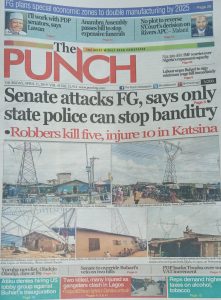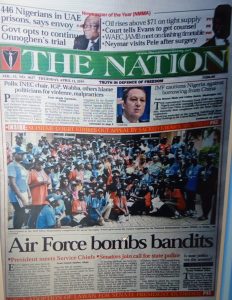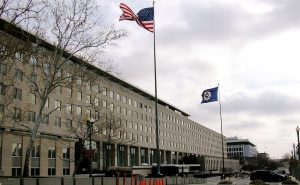The resurgence of banditry in Nigeria remains the big story in town. It is everywhere in the headlines, one of the most powerful source of information for the generality of the people. Daily Trust’s front page lead story Thursday April 11th, 2019, for example, reads: Bandits have taken over parts of Katsina – Masari”. Or that of Punch on the same day which went like this: Senate Attacks FG, Says only State Police Can Stop Banditry”, with a rider: Robbers Kill 5, Injure 10 in Katsina’. The Nation was not too different, writing its own headline thus: Air Force Bombs Bandits’, with riders in ‘President Meets Service Chief’ and Senate Join Call for State Police’.

 It looks straight forward: a nation under siege because, ordinarily, there should be no bandits in a functional, modern state. If there should be no banditry in a functional state, then it means Nigeria has become a dysfunctional state, going by the headlines. Of course, each paper did so from a different standpoint. The Punch did so from the point of view of what it thinks would solve the problem – state police. The Nation reported banditry quite already but from the position that from the angle that the situation might be so bad but something is being done in the Air Force taking the bandits out. Daily Trust quotes Katsina State governor as saying bandits had taken over parts of the state. That must be the paper’s own way of indicating how serious the matter is if the president’s home state is under siege, a siege being confirmed by the governor.
It looks straight forward: a nation under siege because, ordinarily, there should be no bandits in a functional, modern state. If there should be no banditry in a functional state, then it means Nigeria has become a dysfunctional state, going by the headlines. Of course, each paper did so from a different standpoint. The Punch did so from the point of view of what it thinks would solve the problem – state police. The Nation reported banditry quite already but from the position that from the angle that the situation might be so bad but something is being done in the Air Force taking the bandits out. Daily Trust quotes Katsina State governor as saying bandits had taken over parts of the state. That must be the paper’s own way of indicating how serious the matter is if the president’s home state is under siege, a siege being confirmed by the governor.
But it only looks straight forward. It is never so because media headlines do not have the same meaning for everyone as each reader has a different sense of every single story. So, instead of reading the headlines in terms of anarchy in Nigeria, let’s imagine how other readers interpret or react to the above headlines.
Let’s start with that specie of intellectuals called critical scholars. They are certainly going to say that the headlines serve as proof that contemporary capitalism has gone criminal and violent. In other words, they are not standing far from the imaginary association of retired directors of Nigeria’s DSS from whom one could hear the argument that it is struggle for control of solid minerals. “Can’t you see that it is concentrated in Zamfara and Southern Kaduna? Mineral resources anywhere in the world always invite violence” would be the likely quote.
It is not unlikely an Afro-pessimist or a racist looking at Daily Trust headline, for an example, would say: But, where is Nigeria? Is it not in Africa? Well, Africa is the ‘heart of darkness’. So, banditry there cannot be anything new.
A different reader at, say, the State Department might end up seeing an evidence for the thesis of an ungoverned space which they say is the core of insecurity in much of Africa. For him or her, the headline provokes or justifies the kind of Travel Advisory the US issued last week asking her citizens to reconsider travelling to Nigeria in their own interest.
For some top cop in, say Mexico City, the question could be: How many police men and troops does Nigeria have? Is it adequate for that population?
For an Islamophobist, the story might be no more than a prompter for the question: Isn’t the area predominantly Muslims? Aren’t Muslims into jihadism everywhere across the world?

State Department
For some security consultants, the tempting conclusion could be that it is a continuation of Boko Haram. At the Ministry of Defence around the world, it is unlikely that Marshals, Admirals and Generals would be saying, oh, this is a big threat. It is most likely the defence budget is too small. Someone in the British establishment who comes across the same headline could read it as evidence that ‘they’ have stolen the money in that fantastically corrupt country. He or she would be saying something completely different from an opposition ideologue somewhere in Nigeria whose submission would most likely not be too far from this: Don’t you think the cabal knows something about this new turn? The fear was that banditry would escalate if Buhari were defeated. The fact that it is happening in spite of Buhari’s victory must point at a cabalistic move.
There are those who would say this is a ‘Fulani –on – Fulani’ violence just as the incompetence of the government of the day is bound to come from some quarters along the line.
This is an example of how a single headline could trigger a multiplicity of reasoning among the readership. Is it surprising that the media is implicated in everything that goes bad even when they know nothing more than the headline they have written. Of course, that is not to say that news is innocent except that the meaning a reader gives to a headline or to a story has nothing to do with what the headline writer might have in mind. So, even though the editors have nothing to do with the meaning that readers make of what they put out, it is they who are blamed for escalating or exacerbating one conflict or the other. The one reason for this is how text producers, editors in short, either for lack of the knowledge or of the time or the good sense, fail to add the historical context of what they are reporting. If the background is missing, an editor cannot escape being implicated in misleading readers because such background is the only intervening variable against a headline becoming a call to action. It is for this reason Western media reporting of Africa is criticised. The drama, crisis and other negative features that are reported are just reported like that without any background, giving the impression that Africans must be a heck of a race.
The second reason is because of the multiplicity of meaning each story can have and one of which will establish itself as hegemonic. thereby making every headline a case of power over interpretation of facts rather than the facts themselves. No editor can predict which meaning of a story or a headline can become hegemonic as to cause trouble or bring peace but whichever one does implies power. And that is what makes every journalist to be implicated in circulating power through language, being controllers or moderators of discourses. Once that is the case, then it means headlines can be read as disciplinary moves. We see this every now and then but especially April 12th, 2019 when President Buhari made a big show of directing security agencies to send bandits packing. He must have done that just to be seen to be doing something following the successful securitisation of banditry by the media. Otherwise, is a presidential marching order necessary before security agencies flush out any elements challenging the monopoly of legitimate use of violence that gives the state its singularity in human history?
Welcome to media, discourse and power in contemporary Nigeria!




























